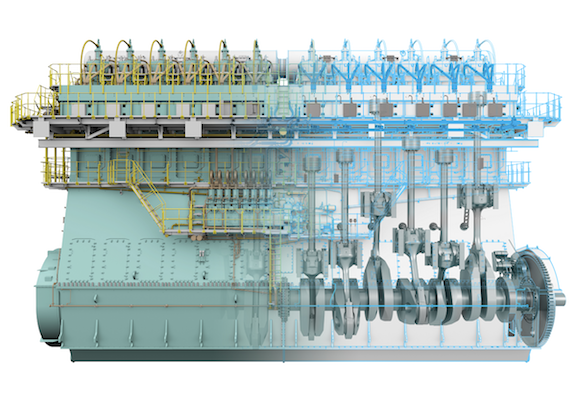WinGD works with oil majors bringing greater transparency to cylinder oil decisions
Jul 14, 2020Engine designer WinGD (Winterthur Gas & Diesel) has prioritized collaboration and transparency in its new cylinder lubrication guide, to ensure that selecting the right oil is easier than ever. For the first time, the new documentation provides ship operators with consolidated, at-a-glance information highlighting the specific usage conditions for each and every approved cylinder oil.

The guidance is the result of several months’ work with major oil companies to make usage requirements more transparent. Previously, the guidelines for each oil were found only in the industry standard No Objection Letters (NOL) issued by WinGD to oil companies, and available only upon request by a customer to an oil company directly. Now this information has been included in the full list of approved cylinder oils.
To find an appropriate cylinder oil, users first select a suitable Base Number (BN) range based on their fuel sulphur content. Customers then look through the guide to see which oil products fall within a specified BN range. The document then highlights whether each oil is approved for general, long-term use or whether further stipulations – such as a time limit or greater frequency of inspections - are required. An additional category, labelled as ‘DF validated’ shows whether the oil has passed a validation trial while burning gas as the predominant fuel during that trial.
"Cylinder oil is not just another consumable onboard – it’s considered an important engine component that ensures reliable operation,” says Frank Venter, WinGD Project Engineer Tribology Fuels & Lubricants. “Given the already wide variability in existing fuels available, it is important that engine companies and oil suppliers work together to offer clarity for ship operators about which oils can be used and how. This will become increasingly important as we embrace a decarbonised future with potentially multiple varied sources of both liquid and gaseous fuels.”
The development follows extensive work with oil majors in the run up to 2020 to ensure that cylinder oils could meet the challenges of new fuel types. The engine designer’s well-established validation procedure has identified many cylinder oils with a broad spectrum of properties (including BN) which are fit for operation with both low and high-sulphur fuels as well as for gas fuel operation.
The correct use of appropriate cylinder oil completes WinGD’s robust and well-proven tribological design concept. Its engines feature state-of-the-art cylinder lubrication systems combined with unique cylinder liner, piston and piston ring designs. These improve reliability and enable a long time between overhaul for combustion chamber components, ultimately resulting in more predictable and lower cost engine maintenance.
Similar Stories

U.S. Department of Energy: $20.2 million in projects to advance development of mixed algae for biofuels and bioproducts
View Article
New funding propels Pier Wind at Port of Long Beach
View Article
Most U.S. petroleum coke is exported
View Article
Paired Power installs two PairTree solar EV chargers at the Port of Hueneme
View Article
KR, HD KSOE, HD HHI, KSS Line, and Liberian Registry partner to develop safety guidelines for ship-to-ship ammonia bunkering
View Article
U.S. associated natural gas production increased nearly 8% in 2023
View ArticleGet the most up-to-date trending news!
SubscribeIndustry updates and weekly newsletter direct to your inbox!





